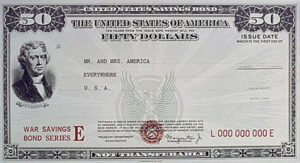Welcome to Extreme Investor Network, where we provide unique insights and information on all things related to economics and investing.
In a recent story that came to our attention, a friend’s daughter ran into a frustrating situation on her 30th birthday when she tried to cash in a number of paper savings bonds that had finally matured. To her surprise, her bank refused to cash them, claiming they had no legal obligation to do so.
This raises an important point about paper savings bonds issued by the US Treasury. While the government stopped issuing paper bonds in 2012 and moved to online platforms, there are still some paper Series I bonds in circulation. However, banks are not required to cash them in, making it difficult for bondholders to access their funds.
The only option for redeeming paper savings bonds is to mail them directly to the Treasury along with a completed FS Form 1522 and copies of government-issued identification. This process raises security concerns, as mail can be lost or delayed, leading to potential risks for bondholders.
Furthermore, there are limited options for cashing paper savings bonds online, adding to the inconvenience for bondholders. With banks having varying policies on cashing bonds and some institutions refusing to do so altogether, the process becomes even more challenging for individuals looking to access their funds.
In hindsight, the friend’s daughter wished she had invested in equities or other assets instead of government bonds, as she would have likely earned a higher return on her investment. This serves as a cautionary tale for investors considering government debt as part of their portfolio.
At Extreme Investor Network, we empower investors with knowledge and insights to make informed decisions about their investments. Stay tuned for more updates and analysis on the latest economic trends and investment opportunities.


